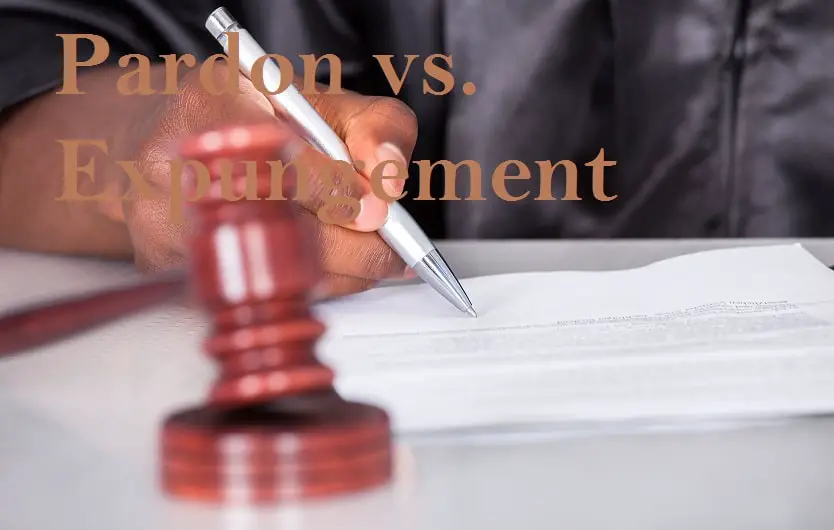You may have heard of the word Pardon from the television or the article you read about someone getting a pardon. But do you really know what pardon means?
Pardon
A Pardon is an action done to an individual who has done a crime. What it does is that it exempts someone from punishment for a crime. The Power that comes from pardoning is an inherent right of the people. In other words, a pardon is a government decision that gives or allows a person who was convicted of a crime to be relieved of the punishment or legal consequences of the crime. The pardon can be granted before or after the conviction of the crime. Although it depends on the jurisdiction laws.
How then does a pardon work?

A pardon is symbolized by forgiving the convicted person. Although you are given a chance or freedom that your sentence will likely be shortened, the records will not be erased and that you will still have an underlying offense. Meaning if you have been pardoned, the crimes you have committed will not be erased in your record books.
A pardon also is not just a single action. A pardon also has different types to which each has its own effect. Here are some of the types of Pardons:
- Full Pardon. If you have been granted a full pardon, consider yourself a lucky person. A full pardon unconditionally removes the person of all the conviction and all of the crime’s consequences or punishments.
- Partial Pardon. If you have been granted a partial pardon, you should still consider yourself a lucky person. However, the Partial Pardon is not the same as the Full Pardon. It differs in a way that it only removes the person of conviction from some of the crime’s consequences or punishments. Thus the word partial.
- Absolute Pardon. If you have been granted an Absolute Pardon, you are one lucky person. The absolute pardon is almost the same as the full pardon. The only difference is that the person granted with an absolute pardon is hereby granted pardon without any conditions.
- Conditional Pardon. Finally, conditional pardon. If you are going to be granted any type of pardon, you are still a lucky person. The conditional pardon will grant you pardon only if you fulfill any action or condition agreed upon before the pardon takes place. For instance, you would be granted the conditional pardon if you are conditioned to help the police in locating a suspect. This instance differs from the condition agreed upon and varies per person. Some conditional pardons can also become void in certain circumstances. An example of this is the former offender committing another crime.
What will you get from being pardoned?
Although getting pardoned does not mean that you are not guilty, and you are given a leeway to shorten your sentence or maybe perhaps erase your sentence fully. There are some other rights you will gain when you are pardoned. Here are some of the rights that will be restored to you when you are pardoned:
- The Right to Vote. If you are pardoned, you will get the rights of other American citizens back. You can vote again based on your wanting.
- The Right to Run for, and hold public office. Getting pardoned also gives you to run for a public position. Being pardoned gives you a chance to change and perhaps improve things for the better by running into public office.
- The Right to serve on a jury. This right gives you the chance to be a part of a sworn body of people to render a verdict on the court. Meaning that you can have a job that will decide on the facts of a criminal or civil case.
- The Right to Possess Firearms. This right is self-explanatory. If you are pardoned, it means that you are given a second chance to prove yourself which means that you are now learning to become a good citizen. By being pardoned, you also can possess firearms. This only works as protection, and if you use it against other people for bad purposes, you will be back in jail in no time.
Who will grant you pardon then? How do I apply for a pardon?
According to Section 2, Article II of the United States Constitution, the only person who can grant a pardon is the President. You might be wondering that it would be hard to get a pardon since there is only one man who can grant a pardon and this person appears to be the highest official of the country. But there is a process. The people who submit to the president the list of people who have a chance to get pardoned are the governors. Under the governors are the pardon boards.
They are tasked to find people eligible for pardoning and make recommendations to the governors who can be pardoned. Although the people on the list does not necessarily mean that they are going to get pardoned, a chance is better than having no chance at all.
Of course, the pardon is not above the law, and there are limits. Here are some notable limits of pardons:
- US and State. The pardon only applies to offenses you have done against the United States or a state. This does not include offenses done on a municipal level. However, the city can pass an authorizing law that allows the mayor to pardon people who are convicted of violating city laws or ordinances.
- Two Times. A person can only be pardoned once. However, there is a slight chance of getting pardoned a second time only if the majority of the state supreme court approves the decision.
- Post-Conviction. In most of the states of the United States, a person cannot be granted pardon unless there is not a conviction yet. You can only get pardoned if you are convicted.
- Certain Crimes. Not all crimes are capable of being pardoned. Some states do not grant pardon to certain crimes such as treason, impeachment, or prisoners who are in the death row.
This is generally what pardon means and is all about, now we look into Expungement.
But first, what is expungement and why do we talk about it with the pardon.
Expungement, or sometimes called expunction, is a court-ordered process that removes the legal record of an arrest of a criminal under their record under the eyes of the law. Meaning that if you get expunged, your previous cases will be erased under your record books.
Expungement is not available to all states, and it varies according to several factors, including the state and the country. In some jurisdictions, getting an expungement is not possible.
What are the effects of Expungement?

Since the expungement will erase your criminal records from your record books, you will not need to disclose the information regarding your criminal records when you are applying for a job. This will help you get a boost in applying for a job since you will be free from previous convictions.
The factors however on how you will get expunged depends on certain factors.
- Jurisdiction. This totally depends on the rules and laws of the state where you are in and varies state per state.
- The Nature of the Crime or the Charge. This depends on whether the crime you have committed is so heavy, like murder, that you will not be given expungement.
- Amount of time that had passed since your conviction. This is also important as they can see whether you have turned out to be a good man since your conviction.
- Criminal History. This comes in handy as they will see if you have committed several other crimes or just one crime. This will be helpful in garnering second chances.
Below is some state-specific information regarding expungement in different states of the US. Here, you can find the information that varies depending on states.
- Alabama – Background Check System (Alabama Criminal Justice Information Centre)
- Alaska – Criminal Records FAQ (Alaska Department of Public Safety)
- Request to Seal Criminal Justice Information (Alaska Department of Public Safety
- Arizona – Criminal History Records (State of Arizona – Department of Public Safety)
- Arkansas – Criminal Background Check (Arkansas State Police)
- California – Clean Up Your Criminal Record (California Courts Self-Help Center)
- Petition and Order for Expungement (California Courts Self-Help Center)
- Colorado – Forms: Sealing of Criminal Records (Colorado Judicial Branch)
- Connecticut – Connecticut Law About Criminal Records (Connecticut Judicial Branch)
- Erasure of Criminal Records (CT Statute) (Connecticut General Studies)
- Delaware – Expungement of Criminal Records (Delaware Code)
- District of Columbia – Sealing Criminal Records (District of Columbia Courts)
- Record Sealing and Expungement (D.C. Public Defender Service)
- Florida – Seal, and Expunge Process (Florida Department of Law Enforcement)
- Georgia – Obtaining Criminal History Record Information (Georgia Bureau of Investigation)
- Hawaii – Expungements (Hawaii Attorney General)
- Idaho – Criminal History Information (Idaho State Police)
- Illinois – Expungement Information (Office of the State Appellate Defender)
- Expungement: Instructions and Forms (Office of the State Appellate Defender)
- Indiana – Limited Criminal History Search (Indiana State Police)
- Iowa – Criminal History Records (Iowa Department of Public Safety)
- Kansas – Criminal History Record Check (Kansas Bureau of Investigation)
- Frequent Questions: Criminal History (Kansas Bureau of Investigation)
- Kentucky – Clean Slate Kentucky: Expungement (State of Kentucky)
- Louisiana – Bureau of Criminal Identification and Information (Louisiana State Police)
- Maine – Criminal History Records Requests (Maine Courts)
- Maryland – Expungement (District Court of Maryland)
- Massachusetts – Requests to Seal Files (General Laws of Massachusetts Ch. 276:100A)
- Massachusetts Restoration of Rights, Pardon, Expungement, and Sealing (Mass. Restoration of Rights Project)
- Michigan – Do-it-yourself Expungement (Michigan Legal Help)
- Minnesota – Criminal Expungement (Minnesota Judicial Branch)
- Mississippi – Mississippi Adult Criminal Record Forms: Conviction or Other Disposition (The Papillon Foundation)
- Missouri – Petition for Expungement of Arrest Records [PDF file] (Missouri Courts)
- Nebraska – Petition to Set Aside a Criminal Conviction (Nebraska Judicial Branch)
- Nevada – Nevada Restoration of Rights, Pardon, Expungement & Sealing (Nevada Restoration of Rights Project)
- New Hampshire – Criminal Records FAQs (New Hampshire Department of Safety)
- New Jersey – How to Expunge Your Criminal Record [PDF file] (New Jersey Judiciary)
- New Mexico – New Mexico Expungements (New Mexico Department of Public Safety)
- New York – Sealed Criminal Records (New York State Unified Court System)
- North Carolina – North Carolina Offender Information (North Carolina Department of Correction)
- North Dakota – Expunging a Criminal Record (North Dakota Attorney General)
- Ohio – Criminal Justice Information System (Ohio Office of Criminal Justice Services)
- Oklahoma – Expunging a Criminal Record (Legal Aid Oklahoma)
- Oregon – Expungement: Set Aside Criminal or Arrest Record (Oregon Courts)
- Clearing Your Record (Oregon State Bar )
- Pennsylvania – Pennsylvania Access to Criminal History (State of Pennsylvania)
- Rhode Island – Expungement of Criminal Records (Judiciary of Rhode Island)
- South Carolina – Expungements and Pardons (South Carolina Courts)
- South Dakota – Computerized Criminal History System (South Dakota Division of Criminal Investigation)
- Tennessee – Guide to Expungement in Tennessee (Tennessee Courts)
- Texas – Crime Records Service (Texas Department of Public Safety)
- Utah – Expunging a Record (Utah Courts)
- Vermont – Expungement Sealing Pardon Information (Vermont Criminal Information System)
- Virginia – Instructions for Petition for Expungement (Virginia Courts)
- Washington – Washington Restoration of Rights, Pardon, Expungement & Sealing (Washington Restoration of Rights Project)
- West Virginia – Expungement of Criminal Record and Criminal Offense Reduction (West Viginia Judiciary)
- Wisconsin – Expunging Court Records (Marathon County, Wisconsin)
- Wyoming – Wyoming Restoration of Rights, Pardon, Expungement & Sealing (Wyoming Restoration of Rights Project)
Do Note that states such as New York do not allow for the expungement of criminal convictions.
Those are just some of the information you need to apply for expungement which would vary depending on the state you are in. I suggest that you read the terms and conditions regarding the information about expungement based on the state where you are in to further widen your understanding about expunging as different states have different procedures. It is best to consult and ask questions.
Pardon vs. Expungement

Although Pardon and Expungement might sound very similar, there is a big difference between them.
Both Pardon and Expungement may seek to clear the name of a convicted person but to different extents. Since each law in the state of the United States differs, there are also differences between the circumstances of pardon and expungement based on the states.
A pardon differs from expungement because pardon basically means that you have been forgiven of the crimes you have done which do not remove the crime from your records. Whilst an expungement will remove the crimes from your record books as if you did not do the crime.
The time frame when you can apply for pardon and expungement also differs. In a pardon, the governor is the one who decides if he or she sees something in you that you are a changed person then he can try to have you granted a pardon. However, in expungement cases, it usually takes 5-10 years before you can apply for expungement depending on the gravity of your offense.
It is best to check websites such as ExpungeCenter.com for premade forms regarding expungements.
If I were going to recommend between pardon and expungement, I would recommend having a pardon first. Because having a pardon will mean that your sentence may be shortened or you can have no sentence at all. After the pardon, you can opt to continue to apply for expungement if you want your criminal records to be erased from your record books. After all, it is easier to find a job if you do not need to disclose any previous convictions you have had in the past.
The process for pardoning an expungement may not be easy that you can obtain in midnight, but if you will be given the chance to be granted pardon or expungement or both, it is worth all the toil and the process. After all, it will grant you the freedom and may give you back the rights you have once lost.
Pardon and Expungement are like second chances in life, you are given a chance to become a better person, do good, and another chance for you to succeed in life. If you are granted pardon and expungement, do not waste the opportunity or chance as this may only come once in your lifetime. Instead, do the things that are right and change into becoming a better person as no one wants to come back to jail.
